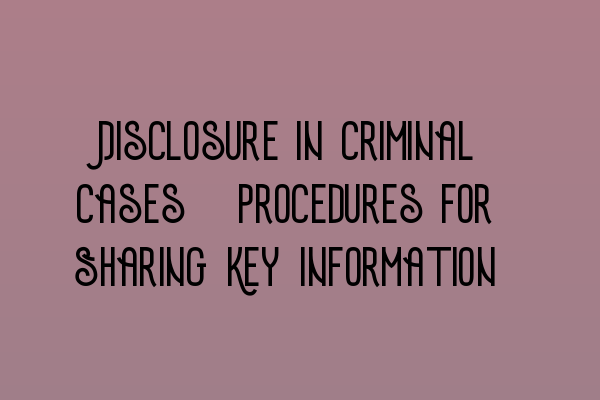Disclosure in Criminal Cases: Procedures for Sharing Key Information
In criminal cases, the disclosure of key information plays a vital role in ensuring a fair and just legal process. Disclosure refers to the process of sharing relevant information between the prosecution and the defense. It enables both parties to prepare their cases thoroughly and facilitates the smooth functioning of the criminal justice system.
The procedure for disclosure in criminal cases is governed by strict guidelines to safeguard the rights of the accused and maintain transparency. These procedures entail the collection, review, and provision of key evidence and information to the defense to ensure a fair trial.
Understanding the Importance of Disclosure
Effective disclosure is crucial to achieving justice in criminal cases. It allows the defense to analyze the evidence presented against their client and develop a robust strategy to challenge the prosecution’s case. Additionally, it helps to uncover any inconsistencies or weaknesses in the evidence, which may be pivotal in securing an acquittal or a favorable outcome for the accused.
Lawyers handling criminal cases must stay informed about the latest procedures and guidelines related to disclosure. By staying up-to-date, they can ensure that relevant information is shared promptly, reducing the risk of trials being delayed or compromised due to inadequate disclosure.
The Procedure for Disclosure
The procedure for disclosure in criminal cases involves several key steps to ensure a fair trial:
- Evidence Gathering: The prosecution collects evidence during the investigation, including witness statements, forensic reports, CCTV footage, and any other relevant material. All evidence must be disclosed unless it falls within a specific exemption, such as national security concerns or witness protection.
- Evidence Review: After gathering evidence, the prosecution reviews each item to assess its relevance to the case. They must disclose any material that either supports the defense’s case or may undermine the prosecution’s case.
- Evidence Sharing: Once the prosecution has reviewed and identified relevant material, they must share it with the defense without delay. This includes providing copies of documents, witness statements, and any other evidence that may assist the defense in preparing their case.
- Defense Review: Upon receiving the disclosed material, the defense must thoroughly review and analyze it. They closely examine the evidence to identify any potential weaknesses or inconsistencies, enabling them to challenge the prosecution’s case effectively.
- Continued Disclosure: Disclosure is an ongoing process, and both parties have a duty to disclose any additional information that emerges as the case progresses. This ensures that all parties have access to the most up-to-date and relevant information, allowing for fair and informed legal proceedings.
Challenges and Considerations
While disclosure is a fundamental aspect of the criminal justice system, it can present challenges for all parties involved. The volume and complexity of evidence, as well as issues related to data protection and legal privilege, can sometimes complicate the disclosure process.
However, it is crucial for legal professionals to adhere to the established procedures and guidelines to overcome these challenges effectively. By doing so, they can ensure that all relevant information is properly shared, minimizing the risk of miscarriages of justice.
Conclusion
Disclosure in criminal cases is a critical component of ensuring a fair trial. It allows for the sharing of key information between the prosecution and the defense, facilitating the proper preparation of cases and maintaining transparency in the criminal justice system.
If you are preparing for the SQE 1 or SQE 2 exams, it is essential to understand the procedures and guidelines related to disclosure. We offer comprehensive preparation courses for the SQE 1 and SQE 2 exams. Don’t miss our SQE 1 Practice Exam Questions and SQE 1 Practice Mocks FLK1 FLK2 to enhance your understanding and improve your chances of success.
For more information about our SQE preparation courses and the upcoming SRA SQE exam dates, please visit our website.
Disclaimer: This blog post is intended for informational purposes only and does not constitute legal advice. It is always recommended to consult a qualified solicitor for any legal issues related to disclosure in criminal cases.
